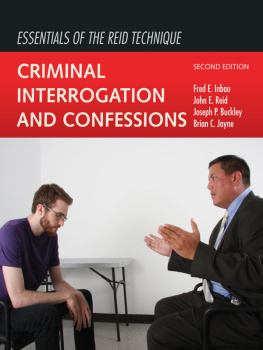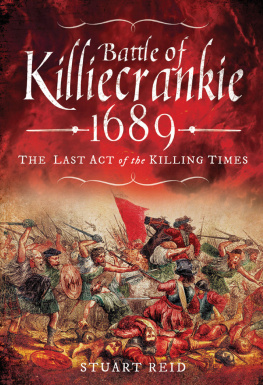Inbau - Essentials of the Reid Technique
Here you can read online Inbau - Essentials of the Reid Technique full text of the book (entire story) in english for free. Download pdf and epub, get meaning, cover and reviews about this ebook. year: 2013, publisher: Jones & Bartlett Learning LLC, genre: Romance novel. Description of the work, (preface) as well as reviews are available. Best literature library LitArk.com created for fans of good reading and offers a wide selection of genres:
Romance novel
Science fiction
Adventure
Detective
Science
History
Home and family
Prose
Art
Politics
Computer
Non-fiction
Religion
Business
Children
Humor
Choose a favorite category and find really read worthwhile books. Enjoy immersion in the world of imagination, feel the emotions of the characters or learn something new for yourself, make an fascinating discovery.
- Book:Essentials of the Reid Technique
- Author:
- Publisher:Jones & Bartlett Learning LLC
- Genre:
- Year:2013
- Rating:4 / 5
- Favourites:Add to favourites
- Your mark:
- 80
- 1
- 2
- 3
- 4
- 5
Essentials of the Reid Technique: summary, description and annotation
We offer to read an annotation, description, summary or preface (depends on what the author of the book "Essentials of the Reid Technique" wrote himself). If you haven't found the necessary information about the book — write in the comments, we will try to find it.
Inbau: author's other books
Who wrote Essentials of the Reid Technique? Find out the surname, the name of the author of the book and a list of all author's works by series.
Essentials of the Reid Technique — read online for free the complete book (whole text) full work
Below is the text of the book, divided by pages. System saving the place of the last page read, allows you to conveniently read the book "Essentials of the Reid Technique" online for free, without having to search again every time where you left off. Put a bookmark, and you can go to the page where you finished reading at any time.
Font size:
Interval:
Bookmark:


World Headquarters
Jones & Bartlett Learning
5 Wall Street
Burlington, MA 01803
978-443-5000
www.jblearning.com
Jones & Bartlett Learning books and products are available through most bookstores and online booksellers. To contact Jones & Bartlett Learning directly, call 800-832-0034, fax 978-443-8000, or visit our website, www.jblearning.com.
Substantial discounts on bulk quantities of Jones & Bartlett Learning publications are available to corporations, professional associations, and other qualified organizations. For details and specific discount information, contact the special sales department at Jones & Bartlett Learning via the above contact information or send an email to .
Copyright 2015 by Jones & Bartlett Learning, LLC, an Ascend Learning Company
All rights reserved. No part of the material protected by this copyright may be reproduced or utilized in any form, electronic or mechanical, including photocopying, recording, or by any information storage and retrieval system, without written permission from the copyright owner.
The content, statements, views, and opinions herein are the sole expression of the respective authors and not that of Jones & Bartlett Learning, LLC. Reference herein to any specific commercial product, process, or service by trade name, trademark, manufacturer, or otherwise does not constitute or imply its endorsement or recommendation by Jones & Bartlett Learning, LLC and such reference shall not be used for advertising or product endorsement purposes. All trademarks displayed are the trademarks of the parties noted herein. Essentials of the Reid Technique: Criminal Interrogation and Confessions, Second Edition is an independent publication and has not been authorized, sponsored, or otherwise approved by the owners of the trademarks or service marks referenced in this product.
There may be images in this book that feature models; these models do not necessarily endorse, represent, or participate in the activities represented in the images. Any screenshots in this product are for educational and instructive purposes only. Any individuals and scenarios featured in the case studies throughout this product may be real or fictitious, but are used for instructional purposes only.
This publication is designed to provide accurate and authoritative information in regard to the Subject Matter covered. It is sold with the understanding that the publisher is not engaged in rendering legal, accounting, or other professional service. If legal advice or other expert assistance is required, the service of a competent professional person should be sought.
Production Credits
Executive Publisher: William Brottmiller
Publisher: Cathy L. Esperti
Senior Acquisitions Editor: Erin OConnor
Editorial Assistant: Audrey Schwinn
Production Assistant: Alyssa Lawrence
Marketing Manager: Lindsay White
Manufacturing and Inventory Control Supervisor: Amy Bacus
Composition: Cenveo Publisher Services
Cover and Title Page Design: Kristin E. Parker
Rights & Photo Research Assistant: Ashley Dos Santos
Cover and Title Page Image: Jones & Bartlett Learning
Printing and Binding: Edwards Brothers Malloy
Cover Printing: Edwards Brothers Malloy
Library of Congress Cataloging-in-Publication Data
Inbau, Fred Edward.
Essentials of the Reid technique : criminal interrogation and confessions / Fred E. Inbau, John E. Reid, Joseph P. Buckley, and Brian C. Jayne.Second edition.
pages cm
Includes bibliographical references and index.
ISBN-13: 978-1-4496-9110-3 (pbk.)
ISBN-10: 1-4496-9110-2 (pbk.)
1. Police questioningUnited States. 2. Confession (Law)United States. 3. Reid technique. I. Title.
HV8073.3.I53 2014
363.254dc23
2013026307
6048
Printed in the United States of America
17 16 15 14 13 10 9 8 7 6 5 4 3 2 1
CONTENTS
PREFACE
John E. Reid graduated from law school during the great depression and opened a private law practice. With clients being few and far between, he joined the Chicago Police Department walking a beat as a patrol officer. At this same time, Fred Inbau was a young professor of law at Northwestern Law School. The two of them became close friends and shared a common interest in developing scientific techniques to assist law enforcement agencies to learn the truth during criminal investigations.
On February 14th, 1929, two Chicago gangs engaged in a shootout in a Chicago alley, which left an abundance of forensic evidence, but no means to analyze the evidence to identify the perpetrators of the crime. In response to the St. Valentines Day Massacre, the Northwestern Crime Laboratory was established to assist police in fighting organized crime. In 1933, Fred Inbau became its first director.
While the focus of the crime lab was on ballistics, it also offered other forensic services, including lie detection. Initially, Leonarde Keeler was the crime labs polygraph examiner, but he left to open a private practice and taught Inbau the lie detection techniques he had developed. For a number of years Inbau was actively involved in conducting examinations and interrogations, but his responsibilities as director frequently called him away from the polygraph lab. He believed that his friend John Reid would make a good polygraph examiner and offered Reid the position.
In the 1930s the polygraph technique was very crude and, more or less, represented a prop to obtain confessions. However, John Reid recognized the potential value of rendering opinions of truth or deception based strictly on recording physiological changes within a suspect. After experimenting with various questioning techniques, he developed what has been called the greatest single advancement in the polygraph techniquethe control question. Reid also recognized the importance of obtaining respiration recordings from both the thoracic and abdominal regions and patented a device for detecting unobserved muscle movements by suspects who tried to beat the polygraph.
John Reid was a compassionate man and highly interested in studying human behavior. For example, he observed that truthful suspects appeared to display different attitudes and behaviors during their polygraph examinations than deceptive suspects. After many years of meticulous documentation, Reid developed categories of what he called behavior symptoms, which seemed to be indicative of truth or deception. Reid also experimented with specialized interview questions he called behavior provoking questions because innocent suspects tended to answer these questions in a manner different from guilty suspects. These questions serve as the foundation for the structured Behavior Analysis Interview.
While the polygraph technique was very beneficial to eliminate innocent suspects, polygraph results were not admissible as evidence to help convict a guilty suspect. To obtain this evidence required a confession from the guilty party. In the 1930s criminal interrogation consisted of breaking the suspects story down piece by piece after hours of intense and intimidating questioning with the hope of walking out of the room with a confession or partial admission. Inbau and Reid developed a completely different approach to interrogationone in which the interrogator expressed understanding and sympathy toward the suspects decision to commit the crime. Rather than try to frighten the suspect into confessing, the interrogator made statements designed to persuade the suspect that it is important for him to tell the truth. Reid was a master at using this approach and, during his career, obtained in excess of 300 murder confessions. Inbaus primary contribution, perhaps as a result of observing Reids interrogations from behind the one-way mirror, was that deceptive suspects often went through predictable steps or stages during the course of an interrogation, eventually leading to the Nine Steps of Interrogation.
Next pageFont size:
Interval:
Bookmark:
Similar books «Essentials of the Reid Technique»
Look at similar books to Essentials of the Reid Technique. We have selected literature similar in name and meaning in the hope of providing readers with more options to find new, interesting, not yet read works.
Discussion, reviews of the book Essentials of the Reid Technique and just readers' own opinions. Leave your comments, write what you think about the work, its meaning or the main characters. Specify what exactly you liked and what you didn't like, and why you think so.












